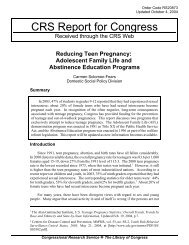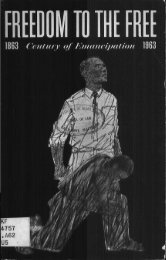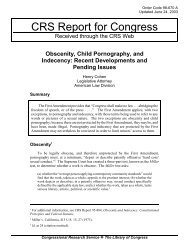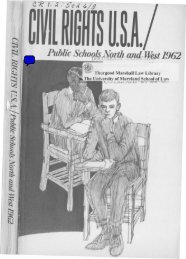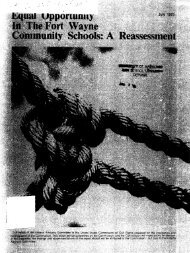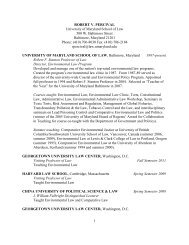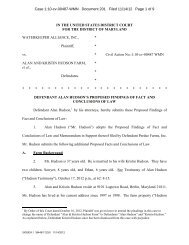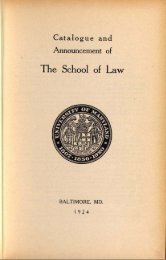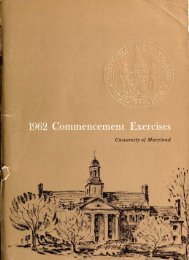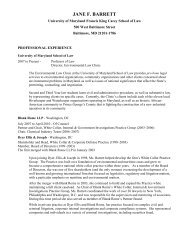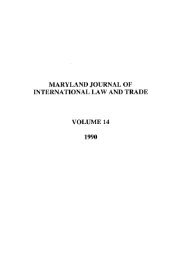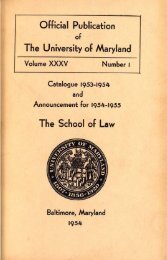University of Maryland School of Law : Catalog, 1988-1989
University of Maryland School of Law : Catalog, 1988-1989
University of Maryland School of Law : Catalog, 1988-1989
Create successful ePaper yourself
Turn your PDF publications into a flip-book with our unique Google optimized e-Paper software.
International <strong>Law</strong> (3)<br />
Students are given an introduction<br />
to international law as applied in<br />
the international arena and in national<br />
courts, including such topics<br />
as the nature, sources and development<br />
<strong>of</strong> international laws; the<br />
making, interpretation, enforcement<br />
and termination <strong>of</strong> treaties;<br />
membership in the international<br />
community; territories; nationalities;<br />
jurisdiction; immunities;<br />
the United Nations and<br />
other international organizations;<br />
state responsibilities and international<br />
claims for wrongs to citizens<br />
abroad; and certain aspects <strong>of</strong> war,<br />
including war crimes trials.<br />
Day (LAW 531 C) and Evening<br />
(LAW 531 H)—Mr. Chiu.<br />
International Moot Court (1)<br />
or (2)<br />
On the recommendation <strong>of</strong> the<br />
faculty advisor, a student who completes<br />
an intramural brief for International<br />
Moot Court may receive<br />
one credit and a student who argues<br />
in the interschool international<br />
competition may receive one<br />
additional credit.<br />
(LAW 538 O—Mr. Chiu.<br />
International Trade <strong>Law</strong><br />
Seminar* (3) and/or Course<br />
(2)<br />
This seminar is designed to prepare<br />
students for practice in the areas <strong>of</strong><br />
international trade and business<br />
transactions. Topics include aspects<br />
<strong>of</strong> the legal structure <strong>of</strong> international<br />
economic relations, national<br />
regulations on international transactions,<br />
General Agreement on<br />
Tariffs and Trade, most-favored-nation<br />
clause, dumping and unfair<br />
trade practices, export control, political<br />
use <strong>of</strong> trade control, trade<br />
between market and nonmarket<br />
economies. A limited number <strong>of</strong><br />
students will be able to take the<br />
seminar as a two-credit course with<br />
a required final examination but<br />
no papers.<br />
Day (LAW 588 C)—Not <strong>of</strong>fered<br />
<strong>1988</strong>-89.<br />
International Transactions (3)<br />
This course deals with selected<br />
legal problems arising out <strong>of</strong> activities<br />
which cross national borders,<br />
including such subjects as<br />
control over foreign affairs, access<br />
<strong>of</strong> aliens to economic activities,<br />
protection <strong>of</strong> foreign investment by<br />
national and international institutions,<br />
multinational corporations<br />
and international aspects <strong>of</strong> conflict<br />
<strong>of</strong> laws. Problems <strong>of</strong> international<br />
trade and investment are<br />
emphasized.<br />
Day (LAW 532 C)—Mr. Chibundu.<br />
Jewish <strong>Law</strong> (3)<br />
This course will study the development<br />
<strong>of</strong> Jewish law from its Biblical<br />
origins to the present in terms<br />
<strong>of</strong> its sources, methodology and application.<br />
Major areas <strong>of</strong> the law<br />
will be analyzed, e.g. .domestic relations,<br />
criminal law and procedure,<br />
thus giving a basis <strong>of</strong> comparison<br />
with the common law.<br />
Knowledge <strong>of</strong> a foreign language is<br />
not required.<br />
Day (LAW 595 Q—Mr. Auerbach.<br />
Judicial Function Seminar* (3)<br />
The purpose <strong>of</strong> this seminar is to<br />
develop an appreciation <strong>of</strong> the<br />
techniques <strong>of</strong> judicial decisionmaking.<br />
The seminar will begin<br />
with a survey <strong>of</strong> those techniques,<br />
followed by a detailed analysis <strong>of</strong><br />
specific problems. In addition, students<br />
will present papers to the<br />
class. Among the topics which will<br />
be considered are the following:<br />
case and controversy versus advisory<br />
opinion; proper and improper<br />
judicial lawmaking; stare<br />
decisis; retroactive overruling; prospective<br />
overruling; statutory and<br />
constitutional limitations on<br />
judges' powers; and discretionary<br />
and required judicial action.<br />
Day (LAW 587 C)—Not <strong>of</strong>fered<br />
<strong>1988</strong>-89.<br />
Jurisprudence Seminar* (3)<br />
and/or Course (2)<br />
In this introduction to legal philosophy,<br />
the major jurisprudential issues—the<br />
definition <strong>of</strong> law, the<br />
concept <strong>of</strong> justice, the relation <strong>of</strong><br />
law to morality and social policy,<br />
the function <strong>of</strong> legal analysis and<br />
the role <strong>of</strong> the legal pr<strong>of</strong>ession—<br />
are considered independently and<br />
in light <strong>of</strong> specific legal theories.<br />
Day (LAW 548 Q— Mr. Brumbaugh.<br />
81



